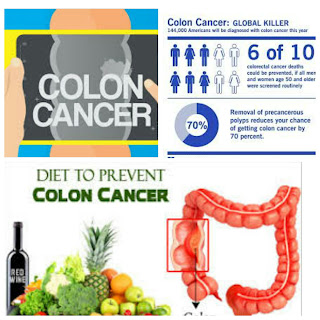Diet to Prevent Colon Cancer
New research into diet and colon cancer has exonerated some
foods that were once thought to increase the risk of the disease. At the same
time, research has confirmed that some food favorites such as processed meats do indeed increase the risk.
Diet and Colon
Cancer: Processed Meat Alert
In the United States, colorectal cancer is the
second-leading cause of cancer death among men and women combined. As with many
cancers, the most serious risk posed by food is simply eating too much of it.
Obesity is linked to an increased risk of colorectal cancer, particularly among
men.
Avoiding red and processed meat in your diet continues to be
the mantra for colon cancer prevention. Over 10 years, high consumption of red
meat increases the risk of cancer in the lower colon and rectum by 30 to 40
percent. For men, high consumption is three ounces of red meat daily; for
women, it’s just two ounces.
The connection between colorectal cancer and processed meats
is even stronger. Over 10 years, high consumption — one ounce five to six times
per week for men and one ounce two to three times per week for women —
increased the risk of cancer in the lower colon and rectum by 50 percent.
“It’s pretty scary. It’s a pretty strong connection and it’s
not huge amounts,” says Colleen Doyle, MS, RD, director of nutrition and
physical activity for the Atlanta-based American Cancer Society.
Foods such as bacon, salami, and hot dogs are widely
recognized as processed meat, but Doyle points out that many seemingly innocent
meats such as sliced turkey fall into that category.
“It’s all that deli meat. If it says ‘cured,’ it’s likely to
be processed,” she says.
Diet and Colon
Cancer: A Plant-Based Approach
Reduce colorectal cancer risk by focusing on a plant-based
diet with limited amounts of meat — that’s the general recommendation of the
American Cancer Society, Doyle says.
“It’s not a bad idea to eat vegetarian for dinner once in a
while. It’s nice to mix it up and try some different things and save your
colon,” she says.
A diet of at least five daily servings of vegetables,
particularly the colorful ones, is still recommended, but cabbage, kale,
cauliflower, and broccoli are no longer considered to impart any particular
protective effect, as they once were, Doyle says.
Dietary fat is no longer a bogeyman in colon cancer. Healthy
fats, such as those found in plant sources or fatty fish like salmon can be
part of a healthy, cancer-smart diet, according to Doyle. “But there are still
a lot of good reasons to eat a lower-fat diet,” she says. “If you’re on a
higher-fat diet, whether it’s healthy fat or less healthy fat, that’s still a
lot of calories. You still want to watch your calories.”
The general recommendations regarding alcohol consumption
apply for reducing colorectal cancer risk: no more than one drink per day for
women and two for men.
Calcium seems to protect against colorectal cancer, but very
high levels are associated with an increased risk of prostate cancer in men. For
this reason, the American Cancer Society recommends that men limit calcium to
1,500 milligrams a day. An easy way to strike a balance on calcium consumption,
Doyle says, is to consume only the recommended daily allowance of calcium for
one’s age and gender and get it through food sources.
The good news is, we can control what we eat. With a little
bit of common sense and awareness of what foods may be bad for you, you may
actually make a difference in your chances of developing colorectal cancer.

No comments:
Post a Comment